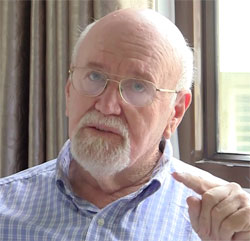The Making of “Why We Love War”
I had some footage left over from the film I made in 2013, called ‘You’re the Enemy – Welcome Back!’
 Some was in the form of an interview with Michael Cull – also known as Shakyamuni – one of the five Vietnam Veterans I had interviewed. He died early in 2018, and I wanted to honour his voice again. Also, war seems to me to be the most fascinating way in which all the elements of our human life are concentrated most intensely, and brought right before our eyes.
Some was in the form of an interview with Michael Cull – also known as Shakyamuni – one of the five Vietnam Veterans I had interviewed. He died early in 2018, and I wanted to honour his voice again. Also, war seems to me to be the most fascinating way in which all the elements of our human life are concentrated most intensely, and brought right before our eyes.
Most people say they hate war, and cite the killing of civilians and the destruction of cities as absolute horrors, which should be avoided at all costs – the antithesis of human civilisation. And yet – the human race is always, and has always, been fighting wars.
Martial music stirs our hearts, soldiers in bright uniforms in marching in step to a military band always bring out the crowds. The best stories of love, loss, sacrifice, heroism take place in times of war. Despair, rage, horror – a testing of personal boundaries, exploits that seem superhuman, surpassing what we normally expect of ourselves – war is their crucible. As many solders have expressed – you never feel more intensely alive than when death is staring you in the face.
I wanted to interview more soldiers, to find out and allow them to express their own experience. Not as easy as I had expected. The Vietnam veterans allowed me to interview them because Michael Cull was my friend, and they Trusted him – and if he trusted me, that was OK. Also, they were members of the American chapter of Veterans for Peace – an organisation of service personnel who have come to realise through their own experience, that war is not going to solve any problems.
My father was in the RAF, and there are ex-soldiers in my own family who gave me introductions to various military organisations – but I couldn’t find anyone who was willing to talk to me. I finally got in touch with Penny Connorton, a woman who runs a charity for ex service personnel suffering from PTSD, and was able to film a group of them as they spoke about their experiences.
Manus Campbell, another of the Vietnam veterans I had interviewed, a close friend of Michael’s, who had been with him as he died, suggested that I get in touch with the British branch of Veterans for Peace. They were making their own movies, but I was able to interview a couple of their members – Ba-then Shahar, who had been an officer in the Israeli army, and is now a psychologist, and Gail Croft, who joined the British Army at 17.
It takes a special kind of courage, to speak out about the failings of a system that you joined with all the trust, Idealism and patriotism of youth – and I am honoured that they were willing to allow themselves to be filmed.
The Officer in the Indian army was actually my landlord in an Airbnb in Coonoor in 2016.
I asked if he would be willing to be interviewed, and filmed him as I was waiting for a taxi to take me to the airport!
